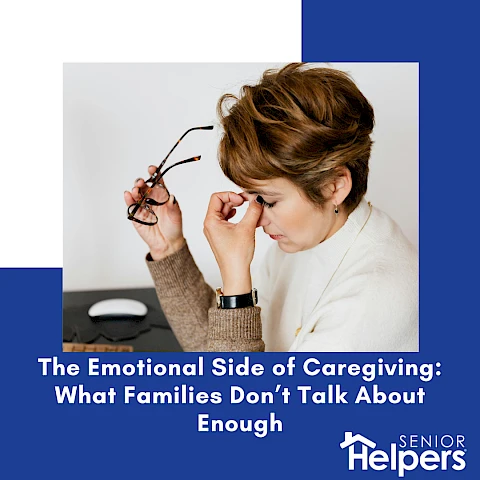
The Emotional Side of Caregiving: What Families Don’t Talk About Enough
Caring for an aging loved one can be one of life’s most meaningful experiences, but also one of the hardest, both physically and emotionally. While families often talk about the physical demands of senior care, the emotional strain is rarely discussed. Behind patience, love, and responsibility lies exhaustion, guilt, and sometimes even resentment. These feelings are normal, shared by caregivers across generations and cultures. But when ignored, the buildup can lead to caregiver burnout.
Understanding Caregiver Burnout
Caregiver burnout is more than tiredness. It is a state of emotional, physical, and mental exhaustion that develops slowly over time, often when a family member focuses so completely on another person’s needs that they neglect their own. Common signs include chronic fatigue, irritability, changes in sleep, and feeling detached or hopeless. Many caregivers experience guilt for wanting a break, yet rest is essential for long-term sustainability.
The Hidden Emotional Weight of Caregiving
Family caregivers often juggle multiple roles including employee, spouse, parent, and caregiver all in one day. Over time, the pressure to “do it all” can take a toll on their health and relationships. Recognizing burnout early allows families to seek help before reaching a breaking point.
Beyond exhaustion, caregiving brings deep emotional challenges. Watching a parent or spouse decline can be heartbreaking and confusing. It is common to grieve the loss of who they once were even while they are still here. Many caregivers feel lonely as friends may not understand the weight of their role, while others struggle with guilt, questioning whether they are doing enough.
These emotions are valid. Acknowledging them does not mean weakness, it means being human. Emotional honesty helps prevent resentment and builds healthier boundaries.
Finding Support and Balance
Support exists in many ways. In-home senior care in Tempe, Ahwatukee, and Phoenix can ease the caregiving load by assisting with daily routines, providing companionship, and offering specialized care for conditions like Alzheimer’s and Parkinson’s. Sharing responsibilities allows caregivers to rest, recharge, and focus on spending meaningful time with their loved ones rather than feeling constantly overwhelmed.
Support groups, both online and in person, can also help caregivers feel understood and connected. Talking with others who truly understand reduces isolation and reminds caregivers that they are not alone. Professional counseling can also help manage stress, grief, and guilt while teaching healthy coping strategies.
Self-care is not selfish, it is essential. Taking breaks, maintaining friendships, and asking for help are vital steps toward emotional stability and sustainable care.
Compassionate Support for Families in Tempe, Ahwatukee, and Phoenix
At Senior Helpers of Tempe we understand how heavy caregiving can feel and we are here to lighten that load. Our trusted caregivers provide personal care, companion care, respite care, and specialized Alzheimer’s and Parkinson’s support, all from the comfort of home.
Whether you need a few hours of help or around-the-clock care, we respond at a moment’s notice with the compassion, reliability, and professionalism your family deserves.
💜 Let’s talk about how we can support your caregiving journey.
Schedule your complimentary in-home care consultation today at Senior Helpers of Tempe or call 480-870-9936.
That’s Senior Care, Only Better.